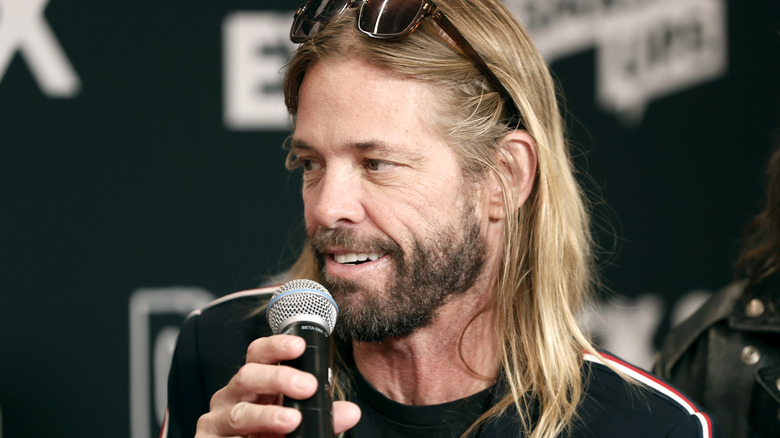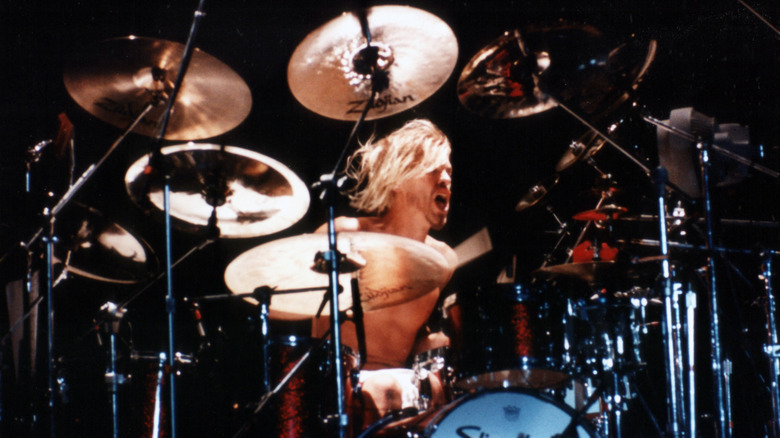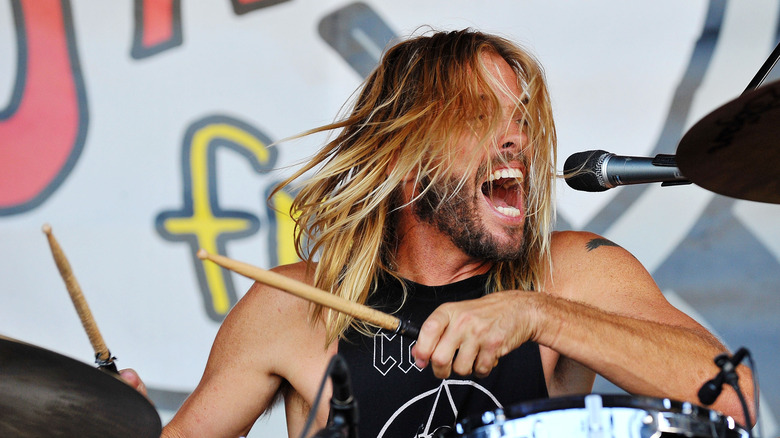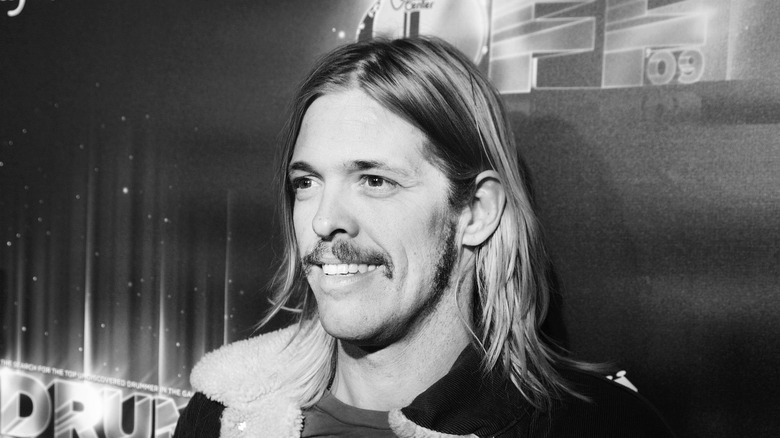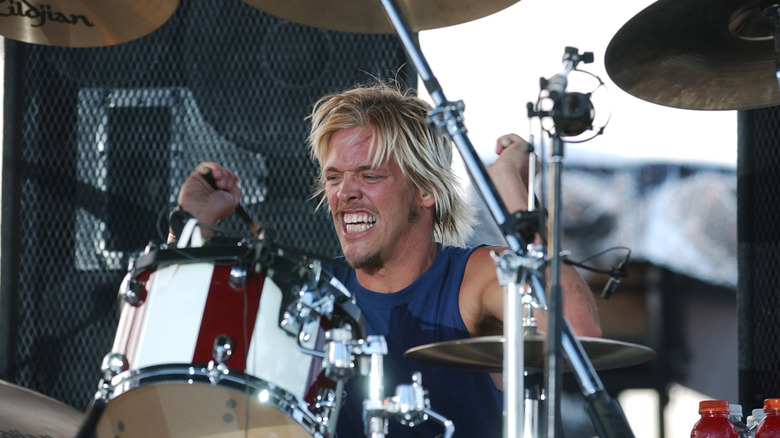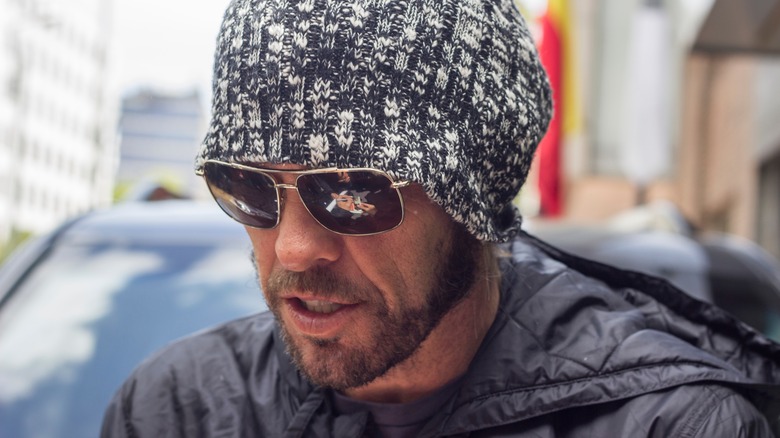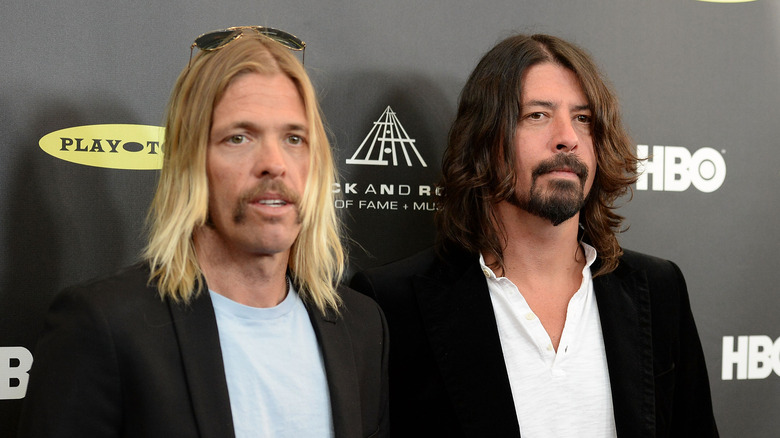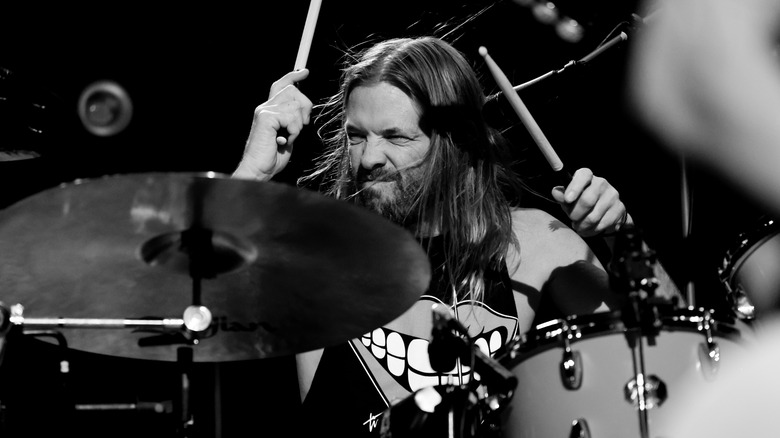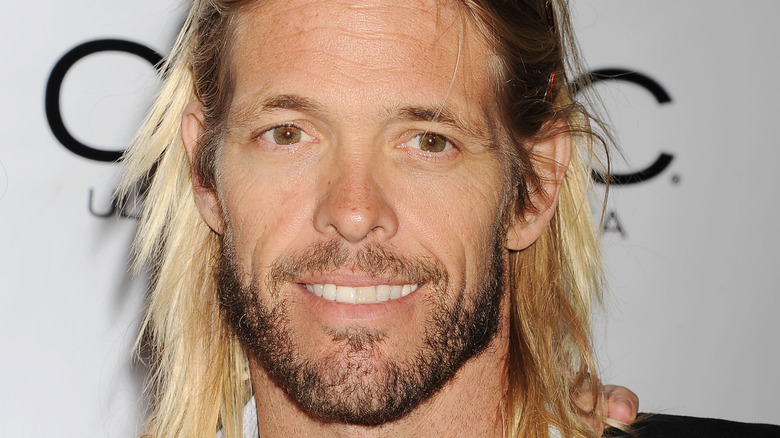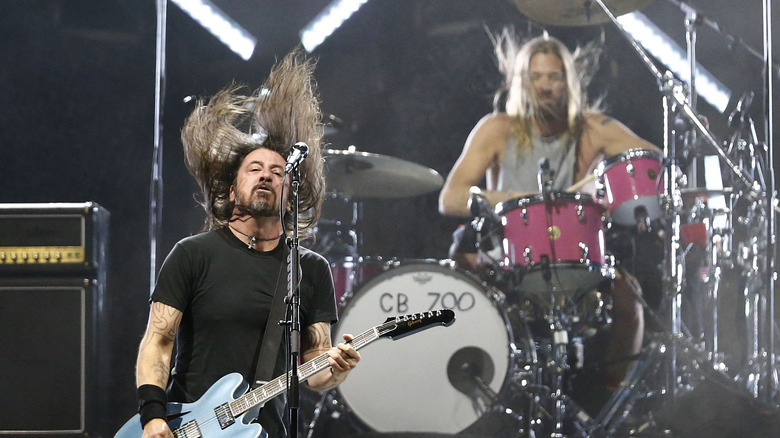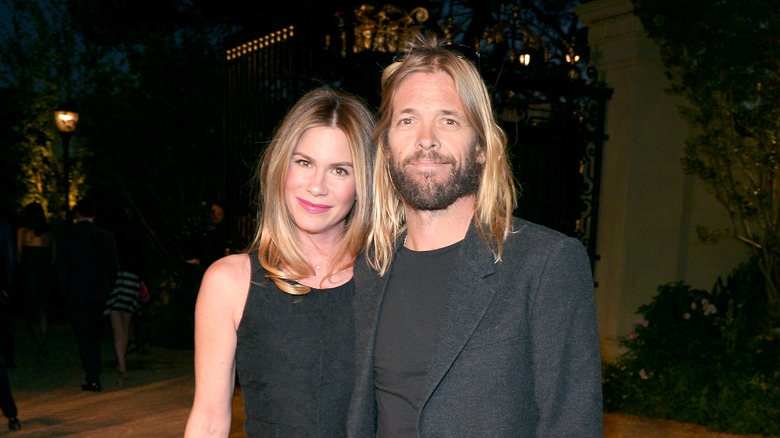The Tragedy Of Foo Fighters' Taylor Hawkins Explained
Taylor Hawkins remains a beloved figure in rock music thanks to the worldwide fame he received as the drummer of the Foo Fighters — a fame spurred by his friend and creative foil in the group, bandleader Dave Grohl. But Hawkins' untimely death in 2022 represented the final tragedy in a series of low points the drummer endured over the years, ultimately leaving listeners wondering where it all went wrong.
In the interviews that Hawkins gave, the rocker was upfront in addressing many personal issues he had experienced, including one particularly dark time that put his life right on the edge when he fell into a weekslong coma. Still, for all the tragedy Hawkins confronted, the musician mostly maintained a positive outlook on things. He also maintained an infectious zeal when he performed for an audience, even in the final concerts of Hawkins' life.
It's easy to wonder what could have been, and the loss of Hawkins will forever leave a sentimental void within the Foo Fighters. Fans and rock lovers everywhere will always miss the blond-haired, bright-eyed Hawkins as he sat on his drum throne behind Grohl, and his recordings with the Foo Fighters will continue to be cherished. Unfortunately, tragedy is also an aspect of Hawkins' story.
Taylor Hawkins started in obscurity before joining Foo Fighters
Taylor Hawkins might have remained a session musician for other artists had he not encountered Foo Fighters bandleader Dave Grohl in the 1990s, subsequently becoming the Foo Fighters' drummer in 1997. But when Hawkins and Grohl first met, Hawkins was touring as a drummer for singer Alanis Morissette, all while yearning for the fellowship of a more communal music group.
The Morissette gig, Hawkins' biggest to that point, followed his early, more obscure stints backing Sass Jordan, another solo artist, and playing in a little-known California outfit called Sylvia. To wit, Hawkins could've stayed in the musical shadows as a sideman, but destiny had other plans. "Anything beats working at Guitar Center," Hawkins once told radio station 94.9 The Rock Toronto. Hawkins was reared on the classic rock of artists like Queen and The Police, and was shaped by early alternative rock such as Jane's Addiction. Naturally, he wanted to be part of a collective rock act, not just part of a solo artist's backline.
"I wanted to play rock, and the Foo Fighters thing just popped up, and it just was just perfect timing," Hawkins added. He joined the Foo Fighters after the band had already recorded their second album, 1997's "The Colour and the Shape," but was firmly in place for 1999's "There Is Nothing Left to Lose" and the ensuing seven studio albums from the group.
He had terrible stage fright
As a famous rock star drummer and a member of the Foo Fighters, one might think that Taylor Hawkins would have ironed out any onstage jitters he had after playing live concerts in public for so many years. Yet the rocker was tormented by a continual stage fright that carried through to his final days. And it's not something he took lightly, as he underscored in one of his last interviews. "I have major stage fright — major, major, major," Hawkins relayed to Rolling Stone ahead of an intimate Foo Fighters club performance in 2021. "Like today is, like, I'm in hell right now," he added in no uncertain terms.
At least in part, Hawkins' stage fright came from his valiant creative aim to achieve drumming perfection during Foo Fighters' marathon gigs — not an easy feat, even for the most seasoned of rock percussionists. But the Foo Fighters drummer was determined to meet or exceed the audience's expectations of him. It was a creative objective that would manifest as anxiety before he was due to go on stage.
"I just have this idea of perfection in my head, how it should be," Hawkins continued to Rolling Stone. In another interview that same year, he echoed the sentiment to Kerrang!, saying, "I just feel a certain way when there's 100,000 people waiting for you to go onstage. I put a big burden on myself to play perfectly — whatever that means — and keep in perfect time."
He faced addiction issues
Addiction is stereotypically associated with rock stars, and sadly Taylor Hawkins was not spared from it during his musical career. The Foo Fighters drummer had a history of substance abuse that included the use of heroin, the addictive and dangerous opioid drug that has notably contributed to several famous creative artists' deaths and ruined countless lives otherwise.
In interviews, Hawkins wasn't shy about the fact that he abused drugs in the past, and he was willing to share his overall liberal outlook on drug use culturally. In his later years, the musician appeared to eschew hard drugs and often noted he was maintaining more of a focus on his health.
Addressing his past with addiction, Hawkins once told Kerrang!, "I just got out of control for a while, and it almost got me. I was heading down a road that was going to lead to even worse paths. Whether someone's sober, or they like a glass of wine with dinner, or they want a bottle of Jägermeister before they go onstage, or they like to smoke doobies all day long, everyone has their own path, and I took it too far."
If you or anyone you know needs help with addiction issues, help is available. Visit the Substance Abuse and Mental Health Services Administration website or contact SAMHSA's National Helpline at 1-800-662-HELP (4357).
A 2001 overdose left Hawkins in a coma
It would take an emergency to give Taylor Hawkins a wake-up call about addiction. In August 2001, only a few short years after he had joined the Foo Fighters, the drummer overdosed on heroin on a trip to London and wound up hospitalized in a coma for two weeks.
The dire situation sent shockwaves through the band, nearly convincing bandleader Dave Grohl to give up Foo Fighters and even music altogether. Hawkins also recalled the instance as a critical juncture, telling Beats 1's Matt Wilkinson in 2018, "That was a real changing point for me."
Grohl told The Guardian in 2011, "When Taylor wound up in hospital, I was ready to quit music. Because, to me, it felt like music equaled death. I started praying. I've never been to church in my life and I'm walking back from Taylor's hospital to our hotel every night, praying out loud in the streets of London."
The overdose came amid production for Foo Fighters' fourth album, what would be 2002's "One by One." The band paused the sessions to allow Hawkins time to recover, but they were a group re-invigorated once the drummer was fully back in the saddle: In spring 2002, all the previous album sessions were scrapped, and the band re-recorded the album anew in a matter of weeks.
If you or anyone you know needs help with addiction issues, help is available. Visit the Substance Abuse and Mental Health Services Administration website or contact SAMHSA's National Helpline at 1-800-662-HELP (4357).
He still had insecurity, even as a rock star
Taylor Hawkins admitted to having insecurities that he believed fueled some of his darker desires. And some of that insecurity was directly rooted in being in the Foo Fighters with a rock legend like bandleader Dave Grohl. After all, before Foo Fighters, Grohl was the drummer for Nirvana, the grunge act that defined rock music for a generation of listeners. How could a drummer like Hawkins stack up against a musical stature like that?
Showing the duality of his friendship with Grohl, Hawkins once told SPIN, "A lot of my insecurities — which led to a lot of my drug use — had to do with me not feeling like I was good enough to be in this band, to play drums with Dave. And it was never anything that Dave ever said. But he pushed me further than he needed to. He could have f***in' given up on me a long time ago, but he believed in me so I could get out of that hole."
Taylor Hawkins almost quit Foo Fighters
There came a time in Taylor Hawkins' career when he heatedly quit the Foo Fighters. At least verbally, he did. Tensions between him and bandleader Dave Grohl reached a boiling point in 2002, leading to an argument that ended with the Foo Fighters front man issuing an injunction. In response, and without mincing his words, Hawkins told Grohl that he was leaving the band.
At the time, Grohl — world famous as the drummer of Nirvana — was moonlighting on drums again in the band Queens of the Stone Age, contributing to some sore feelings for Hawkins as the drummer for the Foo Fighters. In the end, Hawkins and Grohl worked things out between them, but the band was in shambles surrounding their appearance at Coachella 2002, where Queens of the Stone Age also played.
When Hawkins later remembered the incident to Rolling Stone, he explained, "We hadn't finished [Foo Fighters' 2002 album] 'One by One' because it wasn't going so good. I was still coming out of my fog from London. And I was still coming out of my fog from thinking that this [band] should be a complete democracy. We were doing Coachella, and we had a big argument because I was being a f***ing smartass and know-it-all, thinking I know what was right." But after Grohl warned Hawkins that his leadership in the Foo Fighters was "how it is" — take it or leave it — Hawkins recalled that he replied, "All right, I quit."
He knew he had health issues
Taylor Hawkins indicated that he was experiencing a few health issues in the year before his death. When the topic of his health came up in a 2021 interview with Rolling Stone, the drummer revealed that his doctor told him he could have sleep apnea. In the same conversation, Hawkins mentioned having a large heart — though he portrayed that observation positively, going by what his doctor had said.
"I'm healthy; I'm good," Hawkins told the magazine. "I get sinus infections really bad. And I just found out from my doctor, got all my blood tests and my heart everything checked, and he goes, 'Dude, you're in amazing shape. Your heart's big because you exercise a lot. It's like a runner's heart.' And that's fine. The only thing is, he said, 'I think you have sleep apnea.' And my wife's always saying [I] snore."
Sleep apnea can undoubtedly affect the quality of one's life — the disorder that causes you to stop breathing while asleep affects an estimated 39 million U.S. adults, according to the National Council on Aging — but it's unclear if Hawkins ever sought treatment for it. The size of Hawkins' heart was mentioned in the autopsy that was performed after his death, reportedly stating that it was double the size of a normal healthy heart and weighed at least 600 grams.
There may have been other warning signs before his untimely death
There might have been other forewarnings about Taylor Hawkins' health during the Foo Fighters drummer's final year. However, the picture isn't perfectly clear. In a May 2022 Rolling Stone exposé covering Hawkins' final days as a Foo Fighter, the magazine reported that it was the drummer who lost consciousness aboard a plane with the band in December 2021, just three months before his death. When the incident occurred, other news outlets reported about it without naming Hawkins explicitly, only stating that a member of the Foo Fighters was rushed to the hospital.
In response to Rolling Stone's portrayal of the event, a representative for the Foo Fighters said the story about Hawkins was untrue. Still, the magazine claimed that multiple friends of Hawkins' had corroborated the account of him losing consciousness. To make matters even more confusing, two rock star friends of Hawkins' who initially took part in the Rolling Stone piece — Pearl Jam's Matt Cameron and Red Hot Chili Peppers' Chad Smith — subsequently disavowed Rolling Stone's reporting in the article and insisted their quotes were taken out of context.
Taylor Hawkins died suddenly at age 50
Coming as a complete shock to the entire entertainment world, Taylor Hawkins died on March 25, 2022, while he was staying at a hotel in Bogotá, Colombia. The Foo Fighters were there preparing to play a concert that night. Hawkins was 50 years old. According to People magazine, he had reportedly complained of chest pains that day before the hotel summoned an ambulance.
As the sad news of Hawkins' death broke worldwide, Foo Fighters issued a statement on X (formerly known as Twitter) saying they were "devastated by the tragic and untimely loss of our beloved Taylor Hawkins. His musical spirit and infectious laughter will live on with all of us forever. Our hearts go out to his wife, children, and family, and we ask that their privacy be treated with the utmost respect in this unimaginably difficult time." Subsequently, the band canceled all of their upcoming tour dates to regroup.
While fans were searching for answers regarding Hawkins' situation, the attorney general's office of Colombia was investigating the musician's cause of death. Only adding to the anguish as it unfolded, fans would learn that Hawkins' addiction issues may have played a part in the tragedy — the drummer had several substances in his system at the time of his death, including opioids, marijuana, and benzodiazepines. However, apart from the preliminary findings, an official cause of death for Hawkins was not immediately revealed by the Colombian government.
Some friends said he wanted to tour less before his death
In a contentious May 2022 Rolling Stone report that probed the final days of Taylor Hawkins' life, the music magazine posited that Hawkins had grown weary of the Foo Fighters' busy touring schedule and was looking to cut back on performances before he died. "Honestly, I think he was just so tired," said the singer Sass Jordan, one of Hawkins' friends and a former musical colleague, adding her impression that the drummer was sapped by the business of being in the band and was overall "tired of the whole game."
An unnamed friend of Hawkins' also claimed that the drummer sat down and had a heart-to-heart conversation with Foo Fighters bandleader Dave Grohl to discuss the matter in detail. "The fact that he finally spoke to Dave and really told him that he couldn't do this and that he wouldn't do it anymore, that was freeing for him," the anonymous source stated. "That took f***ing balls. That did take a year of working up the guts to do."
However, in the same report, a conflicting comment from the band's camp put that entire characterization into question. A representative for the Foo Fighters refuted the notion that Hawkins was looking for a way out of the band or trying to cut back on live performances, asserting that the drummer "never 'informed Dave and [management]' of anything at all like that."
He left behind a wife and three kids
Taylor Hawkins wasn't just a famous rock star and the drummer of one of the biggest bands on the planet. The Foo Fighters drummer was also a devoted husband and father. He married his wife, Alison, in 2005, and together they had three children — Shane Hawkins (Oliver Shane, born 2006), Annabelle Hawkins (born 2009), and Everleigh Hawkins (born 2014).
Shane is something of a rock musician in his own right. Following in his father's footsteps, he has performed in concert with the Foo Fighters on a couple of occasions — he sat in on drums during the band's "My Hero" as part of their 2022 tribute concerts for his father, and he later joined them onstage again at a subsequent festival set.
The family ties are important to the Foo Fighters, who continue to record and perform following Hawkins' death, the rock band clearly inspired by the outpouring of support they received in the wake of the tragedy. In a note that Foo Fighters bandleader Dave Grohl wrote after the group's first handful of shows back following the drummer's death, the singer and guitarist explained, "Every night, when I see you singing, it makes me sing harder. When I see you screaming, it makes me scream louder. When I see your tears, it brings me to tears. And when I see your joy, it brings me joy."
